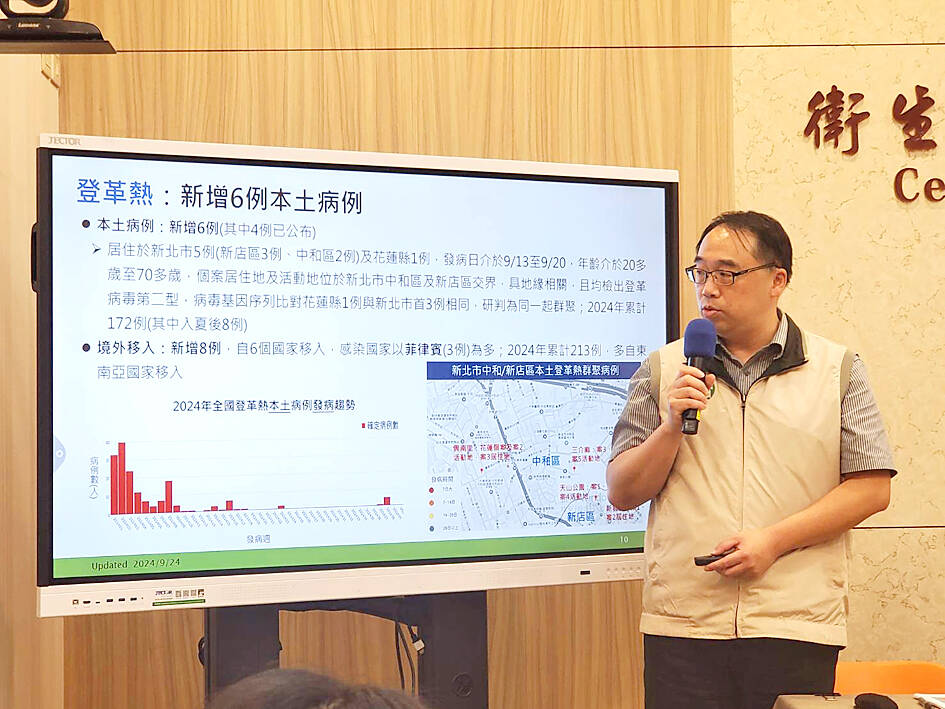This year’s first cluster of dengue fever cases in northern Taiwan was detected in New Taipei City, the Centers for Disease Control (CDC) reported yesterday, adding that the number of enterovirus cases continued to increase, with the epidemic period likely to extend into November.
CDC Epidemic Intelligence Center Director Guo Hung-wei (郭宏偉) said six cases of locally acquired dengue fever were reported from last week to yesterday, including five in New Taipei City and one in Hualien County, and the people began having symptoms between Sept. 13 and Friday last week.
The agency through contact tracing discovered that the cases all live or had recently been near the area where New Taipei City’s Jhonghe (中和) and Sindian (新店) districts meet, he said.

Photo: Lin Hui-chin, Taipei Times
They were also found to be infected with dengue virus serotype 2 (DENV-2), and the Hualien case and three cases in New Taipei City have the same viral genome sequence, so they are considered to belong to the same cluster, he said.
CDC Deputy Director-General Philip Lo (羅一鈞) said the two cases confirmed yesterday had showed unusual symptoms of diarrhea and vomiting.
Physicians and people in the area should be aware that aside from common symptoms of headache and fever or pain behind the eyes, infected people might also have gastrointestinal symptoms, he said.
The New Taipei City Government yesterday closed the hiking trails near Sanjie Temple (三介廟) and Tianshan Park (天山公園) for a month, after finding out that two of the cases had been in the area during the incubation period, Lo said.
The local government has begun a large-scale disinfection operation, and the cluster would be monitored until Oct. 21, he said.
Lo urged people who have recently visited nearby areas and show suspected dengue symptoms to seek medical attention as soon as possible and tell their doctor about their visit to the area.
Meanwhile, Guo said 16,253 hospital visits for enterovirus infection were reported last week, another week of increase.
The CDC’s monitoring data showed that coxsackievirus A10 and coxsackievirus A16 were the two main viral strains circulating in the past four weeks, he said.
A mild case of enterovirus D68, a four-month-old infant, was reported and he recovered, Guo added.
There were 146,558 hospital visits for diarrhea reported last week, also an increase, he said.
“After the Mid-Autumn Festival, hospital visits for diarrhea and enterovirus infection have continued to increase, and we expect the trend to continue this week, likely reaching a peak in early next month,” Lo said.
The recent enterovirus outbreak appeared to be more complicated than initially thought, he said, adding that the two Coxsackievirus strains are competing for dominance.
Cases are likely to increase until the middle of next month, reaching a peak of about 17,000 hospital visits per week, he said.
The number of weekly cases is likely to drop below the epidemic threshold (11,000 hospital visits per week) in mid-to-late November, he added.
There are no vaccines for enterovirus strains other than the enterovirus A71 vaccine, so children and caregivers should especially maintain good personal hygiene, and children’s learning environments and homes should have good ventilation and routine disinfections, it said.

An essay competition jointly organized by a local writing society and a publisher affiliated with the Chinese Communist Party (CCP) might have contravened the Act Governing Relations Between the People of the Taiwan Area and the Mainland Area (臺灣地區與大陸地區人民關係條例), the Mainland Affairs Council (MAC) said on Thursday. “In this case, the partner organization is clearly an agency under the CCP’s Fujian Provincial Committee,” MAC Deputy Minister and spokesperson Liang Wen-chieh (梁文傑) said at a news briefing in Taipei. “It also involves bringing Taiwanese students to China with all-expenses-paid arrangements to attend award ceremonies and camps,” Liang said. Those two “characteristics” are typically sufficient

A magnitude 5.9 earthquake that struck about 33km off the coast of Hualien City was the "main shock" in a series of quakes in the area, with aftershocks expected over the next three days, the Central Weather Administration (CWA) said yesterday. Prior to the magnitude 5.9 quake shaking most of Taiwan at 6:53pm yesterday, six other earthquakes stronger than a magnitude of 4, starting with a magnitude 5.5 quake at 6:09pm, occurred in the area. CWA Seismological Center Director Wu Chien-fu (吳健富) confirmed that the quakes were all part of the same series and that the magnitude 5.5 temblor was

The brilliant blue waters, thick foliage and bucolic atmosphere on this seemingly idyllic archipelago deep in the Pacific Ocean belie the key role it now plays in a titanic geopolitical struggle. Palau is again on the front line as China, and the US and its allies prepare their forces in an intensifying contest for control over the Asia-Pacific region. The democratic nation of just 17,000 people hosts US-controlled airstrips and soon-to-be-completed radar installations that the US military describes as “critical” to monitoring vast swathes of water and airspace. It is also a key piece of the second island chain, a string of

The Central Weather Administration has issued a heat alert for southeastern Taiwan, warning of temperatures as high as 36°C today, while alerting some coastal areas of strong winds later in the day. Kaohsiung’s Neimen District (內門) and Pingtung County’s Neipu Township (內埔) are under an orange heat alert, which warns of temperatures as high as 36°C for three consecutive days, the CWA said, citing southwest winds. The heat would also extend to Tainan’s Nansi (楠西) and Yujing (玉井) districts, as well as Pingtung’s Gaoshu (高樹), Yanpu (鹽埔) and Majia (瑪家) townships, it said, forecasting highs of up to 36°C in those areas